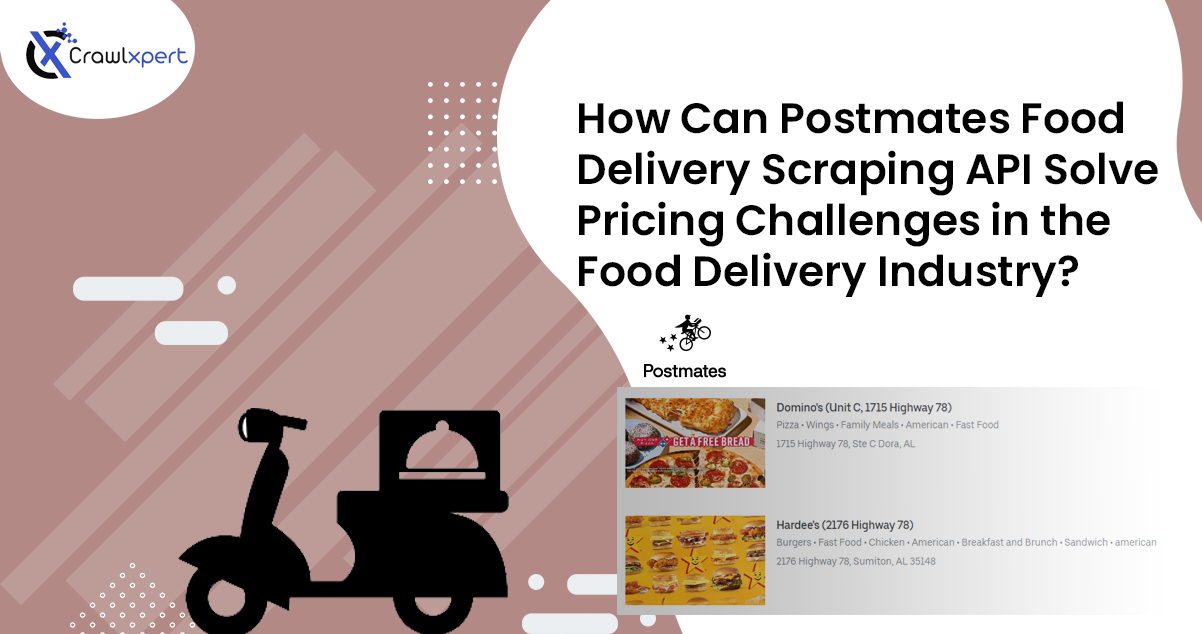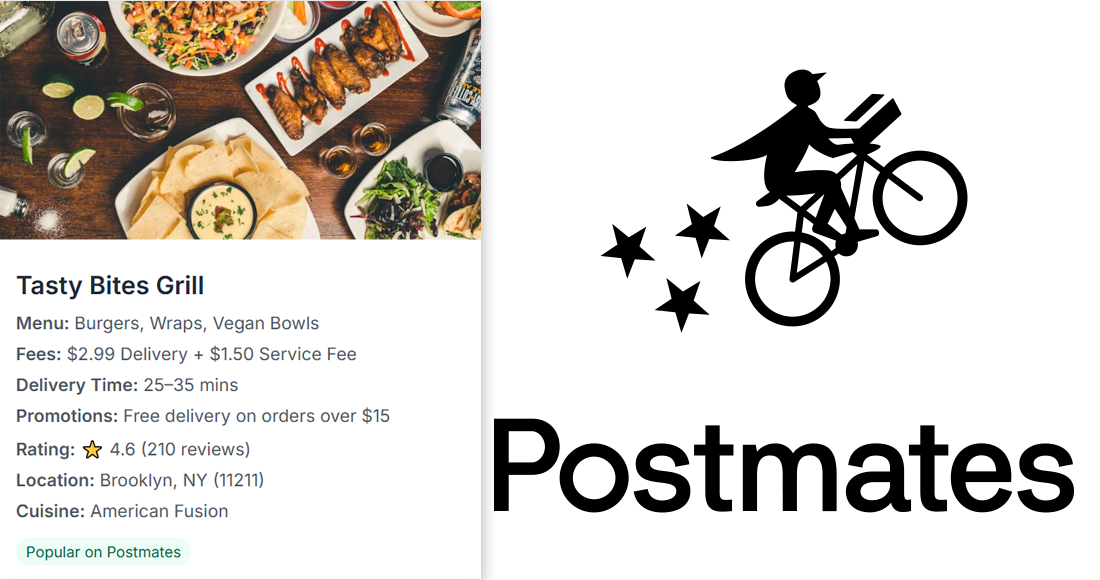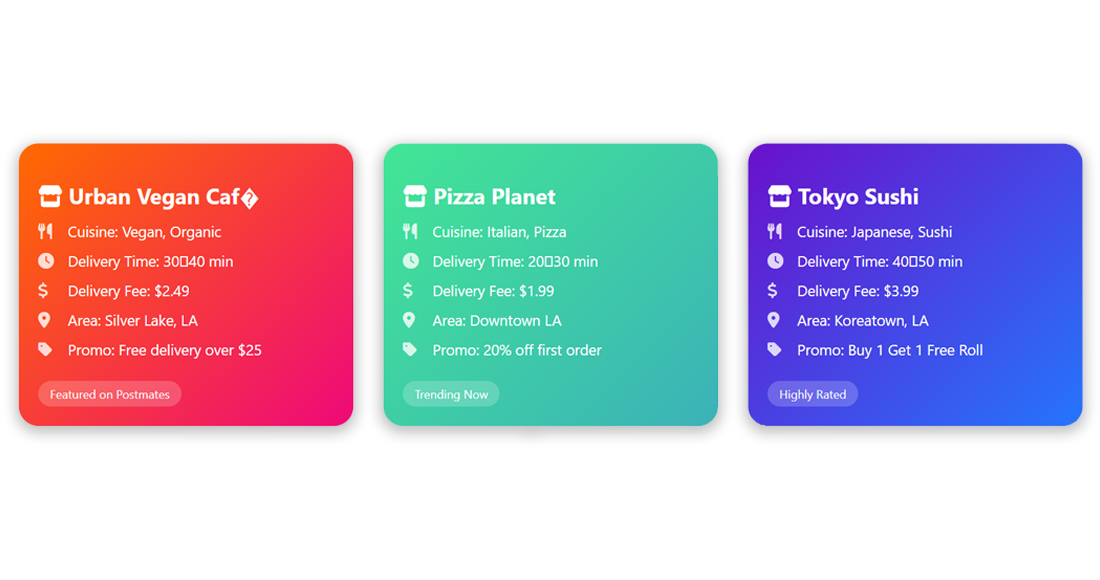
How Can Postmates Food Delivery Scraping API Solve Pricing Challenges in the Food Delivery Industry?
Published on September 28, 2025
The food delivery industry has exploded over the past few years, with platforms like Postmates, Uber Eats, and DoorDash reshaping how people access food. As delivery becomes a key part of how restaurants operate and how customers dine, pricing has emerged as a major battleground. Restaurants face the challenge of maintaining profit margins while staying competitive, and customers seek value in an environment where convenience often carries hidden costs.
Enter data scraping. By using a Postmates Food Delivery Scraping API, businesses, analysts, and restaurant chains can extract real-time pricing, competitor menu listings, and dynamic delivery fees. This empowers them to optimize pricing strategies, reduce costs, benchmark against competitors, and respond to local demand shifts in real time.
In this blog, we will explore:
- The pricing challenges in food delivery
- What data Postmates offers
- How scraping Postmates helps solve pricing problems
- Technical methods to scrape Postmates
- Real-world use cases
- Ethical and legal guidelines
1. Pricing Challenges in the Food Delivery Industry
Food delivery pricing is more complex than it appears. Behind every total cost displayed in your app lies a combination of:
- 🍔 Menu Price Disparities
Many restaurants list higher prices on delivery platforms than in-store to cover commissions (often 15–30%). - 🚚 Variable Delivery Fees
Fees vary depending on:- Location
- Time of day
- Demand spikes
- Promotions
- 💸 Surge Pricing and Small Order Fees
Customers pay extra during busy hours or for small basket sizes. - 🤝 Competitor Pressure
Restaurants need to keep their offerings competitively priced relative to similar eateries nearby. - 📈 Inconsistent Discount Application
Not all restaurants apply promotions equally, leading to customer confusion and conversion issues.
To address these issues, businesses need data visibility across competitors, times, and locations—and that’s where scraping Postmates data becomes essential.

2. What Data Can Be Scraped from Postmates?
Although Postmates was acquired by Uber Eats, its web-based infrastructure still supports city-level listings, dynamic pricing, and vendor data that’s publicly accessible.
| Data Type | Description |
|---|---|
| Restaurant Name | Official name listed on Postmates |
| Menu Items | Full listing of items, descriptions, and prices |
| Fees | Delivery fees, small order fees, service charges |
| Delivery Time | Estimated delivery duration |
| Promotions | Discounts, free delivery, bundled deals |
| Rating | User-generated ratings and review counts |
| Location | ZIP code or neighborhood served |
| Cuisine Type | Helps in competitor classification |
3. How Scraping Postmates Solves Pricing Problems
Here’s how a Postmates scraping API can directly address pricing issues:
- 📊 Competitive Price Benchmarking
Scrape menu prices of competitors by cuisine and region. This helps restaurants:- Avoid underpricing or overpricing
- Adapt menu rates per ZIP code
- Detect premium positioning opportunities
- 💰 Understand Delivery Fee Dynamics
Track fluctuations in delivery charges and small order fees across time and zones. Businesses can:- Absorb or reduce customer cost where possible
- Time promotions to offset high-fee periods
- 📉 Discount and Promotion Tracking
Collect data on which vendors are running deals and how they affect order volume. Enables:- Counter-discounts during local surges
- Partnership planning with Postmates for better promo visibility
- 🕒 Time-Based Pricing Patterns
Scrape data by time of day to observe:- Peak pricing hours
- Item price adjustments
- When delivery fees are highest

4. Technical Stack: How to Scrape Postmates Data
🛠️ 4.1 Tools Required
| Tool | Purpose |
|---|---|
| Python | Primary language |
| Selenium | Automate browser and render JS pages |
| BeautifulSoup | Parse HTML |
| Requests | For direct endpoint calling |
| Pandas | Structure and export data |
| Proxy Rotation | Avoid IP blocking if needed |
🧪 4.2 How the Postmates Web App Works
Visit: https://www.postmates.com
Enter a ZIP code (e.g., 90210), and observe restaurant listings. Open Developer Tools > Network and search for XHR/Fetch requests loading vendor data.
Look for URL patterns like:
https://postmates.com/store/<store-id>Or category search endpoints returning JSON:
{
"store_name": "Joe’s Pizza",
"address": "123 Main Street",
"menu_items": [...],
"delivery_fee": "$1.99",
"estimated_time": "25–35 mins",
...
}🔁 4.3 Sample Script Using Selenium + BeautifulSoup
from selenium import webdriver
from bs4 import BeautifulSoup
import time
import pandas as pd
driver = webdriver.Chrome()
driver.get("https://www.postmates.com/los-angeles")
time.sleep(5) # Wait for JS to render
soup = BeautifulSoup(driver.page_source, 'html.parser')
restaurants = soup.find_all("div", class_="StoreCard") # Class names may vary
data = []
for res in restaurants:
try:
name = res.find("h2").text
cuisine = res.find("div", class_="Cuisine").text
time_est = res.find("span", class_="TimeEstimate").text
delivery_fee = res.find("div", class_="DeliveryFee").text
data.append({
'Restaurant': name,
'Cuisine': cuisine,
'Delivery Time': time_est,
'Delivery Fee': delivery_fee
})
except:
continue
df = pd.DataFrame(data)
df.to_csv("postmates_data_losangeles.csv", index=False)
driver.quit()5. Business Use Cases: Postmates Data in Action
- 🍕 Restaurant Menu Optimization
A pizza chain uses Postmates scraping to track competitor topping combos and bundle pricing. It redesigns its menu layout and pricing, increasing delivery revenue by 15%. - 🌆 Hyperlocal Strategy
An emerging vegan food brand monitors Postmates data across San Francisco ZIP codes to identify underserved areas, leading to the launch of three dark kitchens. - 💸 Promo Intelligence
A fast-casual burger brand scrapes Postmates daily to benchmark competitor discounts and free delivery zones. It times promotions to outperform rivals in key locations. - 📊 National FMCG Brand
A snack manufacturer monitors listing prices of its SKUs across different delivery partners via Postmates. Discrepancies help them renegotiate terms and optimize retail visibility.
6. Benefits of Using Postmates Scraping API
| Benefit | Impact |
|---|---|
| ✅ Real-time Pricing Feedback | Adjust pricing dynamically across regions |
| ✅ Improved Customer Retention | Keep pricing competitive during surge hours |
| ✅ Inventory Forecasting | Predict best-selling items from demand patterns |
| ✅ Better Partner Negotiations | Use data to argue for better commission rates |
| ✅ Boost Ad ROI | Target high-margin zones during peak hours |
7. Potential Challenges in Scraping
| Challenge | Solution |
|---|---|
| JavaScript-rendered pages | Use Selenium or Puppeteer |
| IP blocking | Rotate proxies and throttle requests |
| HTML changes | Update CSS selectors periodically |
| Legal concerns | Scrape only public data at low frequency |
8. Legal and Ethical Considerations
✅ Scraping responsibly means:
- Respecting robots.txt
- Avoiding personal data collection
- Not harming servers (e.g., via high-frequency scraping)
You must use data for:
- Competitive analysis
- Internal insights
- Market research
Avoid reselling or public redistribution of scraped content without permission.
Conclusion
The food delivery industry is as much about data as it is about food. As price sensitivity grows, especially in a post-pandemic inflationary economy, data-driven pricing strategies are no longer optional—they’re essential.
Scraping Postmates with the right tools allows you to:
- Monitor competitors
- Optimize fees and promos
- React in real-time to market shifts
- Win customer trust through smart pricing
If you're in food service, Q-commerce, or CPG retail, leveraging Postmates scraping isn’t just clever—it’s a competitive necessity.

